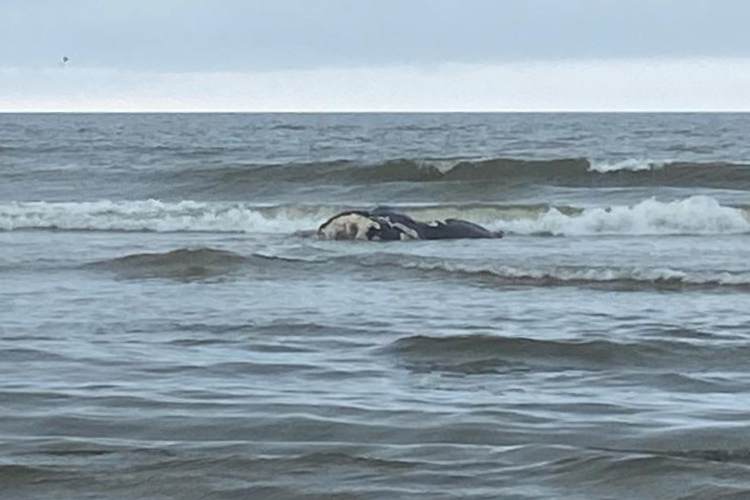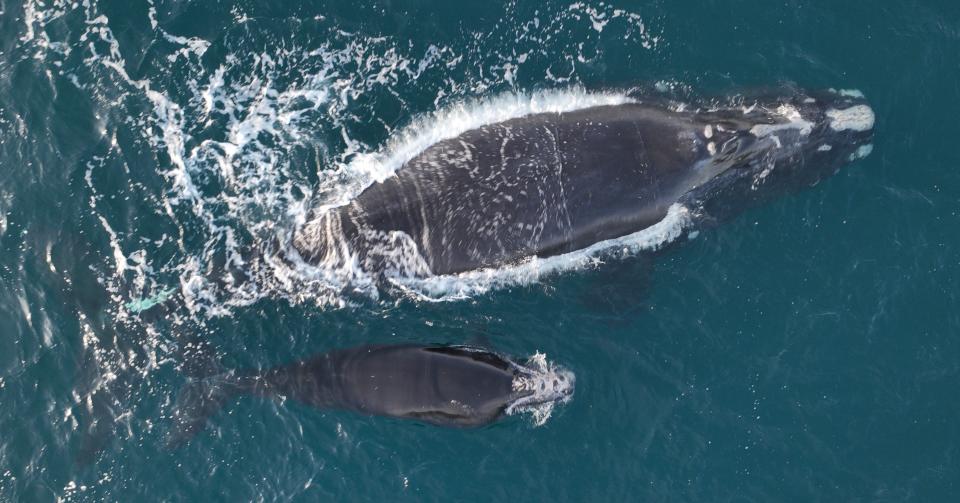'A sad situation.' Newborn right whale calf injured by boat turns up dead in South Carolina
In another blow to the North Atlantic right whale population, a newborn calf has died, putting the death toll for the critically endangered animals at five in just the last three months.
On March 3, two months after fishermen spotted it offshore from Edisto, South Carolina, with its head, mouth and lips cut open by a boat propeller, the calf was reported dead on Cumberland Island National Seashore in Georgia, according to the National Oceanic and Atmospheric Administration's Fisheries division.
The baby was the firstborn of the current calving season. It was initially spotted with its mother, Juno— listed as No. 1612 in the North Atlantic Right Whale Catalog — on Nov. 28. It was Juno's eighth known calf since 1986.

"The carcass was heavily scavenged by sharks. Responders identified it as Juno’s calf based on the unique injuries and markings documented when the calf was alive," NOAA Fisheries reported this week. "Due to the state of the carcass, we will use genetic testing to determine the sex."
The calf is the second North Atlantic right whale in less than a month to die after being struck by a vessel. The other was a female yearling found dead offshore of Savannah, Georgia, on Feb. 13, the first known offspring of Pilgrim (#4340) — a local favorite thought to have been born in 2013 in the warm waters of Cape Cod Bay near the Pilgrim Nuclear Power Station.
Vessel strikes and entanglements in traditional fishing gear are now considered the top threats to the survival of the species. Within the calf's family alone, its mother, Juno, has suffered from four entanglements, and other family members have experienced 24 entanglements and two vessel strikes, according to data from the New England Aquarium.
The latest population study, released this fall, estimated the population at about 356 individuals, plus or minus seven, with relatively few reproductively mature females.
"It's a sad situation," said Philip Hamilton, a senior scientist at the New England Aquarium's Anderson Cabot Center for Ocean Life.
Although the baby was observed nursing in the days following its injury, reported on Jan. 3, and seemed to be getting enough nutrition based on its body condition, researchers said early on that its prognosis was not optimistic.
The calf's mouth and lips were "so structurally damaged," Hamilton said, "in my assessment, it would have been challenging to open its mouth to swim along the surface (to feed after weaning)."
So far this calving season, which extends from mid-November to mid-April, 19 calves have been born into the population. Juno's calf is one of three mortalities among the newborns. While Juno's calf is the only one whose remains have been found, two other newborns are no longer with their mothers and are presumed deceased from unknown causes.
Besides the three calves, and the yearling found off Georgia, a 3-year-old female (#5120) washed up dead on Martha's Vineyard on Jan. 28. That individual suffered a chronic entanglement with traditional fishing rope consistent with rope used in Maine state waters for trap/pot buoy lines, according to NOAA Fisheries.
The loss of females is especially troublesome, Hamilton said, since each one may produce upwards of 10 offspring over a lifetime. Charles "Stormy" Mayo, director of the Right Whale Ecology Program at the Center for Coastal Studies in Provincetown has noted there are only about 70 reproducing females, who don't reach maturity until about age 10; on top of that, researchers have noted a lower birth rate and longer intervals between births.

Hamilton said science is still being done on the reproductive success of male right whales, though it's thought most of them sire only a few calves "with one or two exceptional males siring up to 10." If that is the case, the species' ability to rebound is more closely tied to the survival of females. But that's challenging when the whales face threats from entanglements and boat strikes.
Every injury from these causes is a concern, scientists such as Mayo and Hamilton say, because it can lead to an individual's death, or disrupt a whale's ability to thrive and successfully reproduce to help replenish the population.
"As always, those two issues are just front and center," Hamilton said.
There are some protections in place, but scientists and conservationists say they don't go far enough to protect the whales throughout their habitat — territory that stretches the length of the eastern seaboard up to the Canadian Maritimes.
U.S. Rep Bill Keating, who on Tuesday discussed various subjects during a meeting with Times' reporters, said measures such as seasonal speed zones where the whales are active and ropeless fishing gear programs are not consistent throughout the whales' habitat.
Massachusetts has some of the strongest regulations in place, he acknowledged, but many other areas don't do enough. He supports strengthening and expanding seasonal speed requirements consistently throughout the habitat, and financial assistance for fishermen to convert to fishing gear that reduces or eliminates the need for ropes.
At the federal level, stronger rules are under consideration, and conservationists are urging immediate action — particularly in southeastern waters where calving happens and where mothers and calves are especially vulnerable. At present, Hamilton said, speed restrictions along much of the Mid-Atlantic apply only to vessels over 65 feet in length and are in place only in certain areas.
According to NOAA Fisheries, initial findings from the investigation into the death of Juno's calf suggest the vessel involved in the calf's injuries was smaller, likely 35 to 57 feet in length.
“We cannot save North Atlantic right whales from impending extinction if we do not take commonsense measures to protect them, especially calves and juveniles, from being run over and killed by boats,” said Jane Davenport, a senior attorney at Defenders of Wildlife, in an email this week.
Existing federal seasonal speed restrictions are outdated, and protect "limited areas where right whales showed activity in 2008," the organization said. Proposed expanded speed rules, first published in 2022, would require vessels between 35 and 57 feet long to comply with seasonal slowdowns along with the larger vessels.
Oceana insists that an updated vessel speed rule covering the smaller boats, plus increased enforcement, "are both necessary" to protect right whales. According to the organization's analysis, nearly 80% of ships already subject to mandatory speed limits (65 feet and over) violated these limits during the period Juno’s calf was struck "and left with critical injuries."
"Our government already knows what to do to protect these critically endangered whales, so why are they sitting on it?" said Hermina Glass-Hill, a senior field representative for Oceana out of Georgia in a statement issued Tuesday. "Secretary of Commerce Gina Raimondo and President Biden need to immediately release the updated vessel speed rule their own agency proposed nearly two years ago. Until they do, this right whale’s death, and the future ones to come, are on their watch.”
Heather McCarron writes about climate change, environment, energy, science and the natural world. Reach her at hmccarron@capecodonline.com, or follow her on X @HMcCarron_CCT
The Cape Cod Times mobile app gets you to the heart of the matter — fast. Whether breaking news, sports, entertainment or weather get succinct, personalized coverage along with award-winning videos, captivating photography, and interactive user features. Download the app.
This article originally appeared on Cape Cod Times: Newborn right whale calf injured by boat found dead in South Carolina

